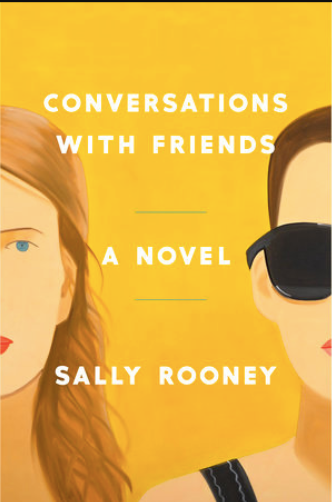Conversations With Friends: Mental Illness and Polyamory Under The Microscope
Sally Rooney's novel Conversations with Friends felt like a throwback to being a student at university. Everyone around you seems to find their place in intellectual conversations about feminist poets and relationships are blurred and often confusing, but by choice.
The style of the novel is refreshing and young. The dialogue goes back and forth between in-person conversation and much deeper, and more intimate texts and emails. There's no time wasted on tedious descriptions of setting and details, Rooney goes straight to the point, moving through the story at a pace that makes the book a breeze and the story impactful at times, incredibly arousing at others.
The stories within the book seem to work under a university logic. Polyamory is forgiven, discussions on politics are encouraged at every table and at every party, and lashing out to perfect strangers due to your strong beliefs is laughed about, taken as proof of strong will. It seems like every argument, every fight, every infidelity can be solved with a long-worded, heartfelt e-mail or call.
We start the book with Bobbi and Frances who used to date but have since remained friends who often fear falling into one another's shadow. Bobbi, a lively, beautiful, openly gay, openly political college student. Frances, our narrator, is a quieter, bi-sexual writer who often struggles with imposter syndrome. They meet a married couple in their 30s and find themselves in love with them, each of them gravitating towards a different half of the same marriage. As Bobbi takes Melissa's attention, basking in her talent as a photographer, Frances soothes Nick, Melissa's husband, who has long suffered from depression.
"The relationships of the people who appeared in the photographs, without Melissa, became unclear"
A particularly interesting matter that we see highlighted over and over in the story, but not spoken about nearly as much between the characters is mental health. Frances even goes as far as to say:
" [..} I had thought people who were hospitalised for psychiatric problems were different from the people I knew. I could see I had entered a new social setting now, where severe mental illness no longer had unfashionable connotations. I was going through a second upbringing: learning a new set of assumptions, and feigning a greater level of understanding than I really possessed. By this logic, Nick and Melissa were like my parents bringing me into the world, probably hating and loving me even more than my original parents did. This also meant I was Bobbi's evil twin, which didn't seem at the time like taking the metaphor too far."

Though she's shifted into a world where mental health is openly discussed, Nick's plight with depression mentioned on more than one occasion, still Frances swallows all her pain. Instead, we see behaviors in Frances like cutting, mental bargaining and limit-setting, in order to cope with the life she faces. Her father is an alcoholic, her mother is dismissive, and she's often struggling for cash.
"I decided that before reading it I would take a walk around the library desks. Slowly, I arose from my seat and began my walk."
She will do anything she can to cope with her immense thoughts, anything, but talk about them.
"Instead of thinking gigantic thoughts, I tried to focus on something small, the smallest thing I could think of. Someone once made this pew I'm sitting on, I thought. Someone sanded the wood and varnished it. Someone carried it into the church."
This also is a reminder of adolescence and young adulthood. To live a life where you're not allowed to voice mental health issues, where rebellion and depression are somehow expected. Rooney's conversations with friends is a reminder that our own conversations with friends are often just scraping the surface, and could essentially point to how much further we'll open up in modern society where we'd much rather open up virtually than over a bottle of wine.
This is a throwback to that time when we'd prefer to be noncommittal than explain that we've gotten attached to that person we're casually dating. We prefer to cry ourselves hoarse than say we actually felt something.
Conversations with Friends is an impactful read that, though hardly decorative in its telling, ties you carnally and emotionally to its characters and leads you to dream about their futures beyond its ending.
